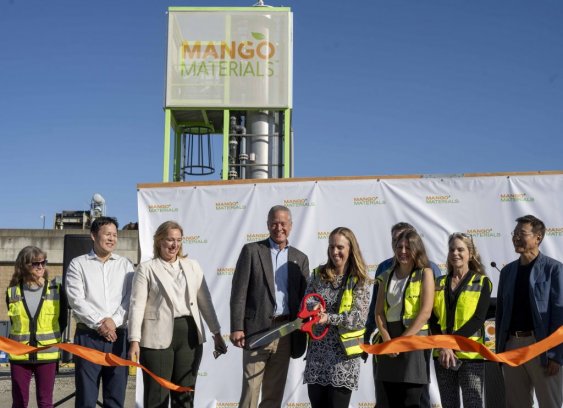
Mango backing for Recovo
Abundant waste stream has the potential to become a low-cost and highly scalable source for new polymers and fibres.

12th August 2024
Innovation in Textiles
|
Dornbirn, Austria
Mango Materials will be one of 23 pioneering companies presenting new fibre solutions at the 4th Innovation Days conference which runs alongside the established Dornbirn Global Fibre Congress (GFC) from September 11-13, providing attendees with access to a total of 125 lectures across four parallel sessions on a wide range of industry themes.
Mango Materials is a biomanufacturing company located in the greater San Francisco Bay Area, founded in 2012 by an all-women group of researchers from Stanford University based on a unique approach to transforming methane into biodegradable biomaterials.
Biomanufacturing hub
In Dornbirn, Mango research scientist Figen Selli will provide details of the company’s progress since opening its first facility at the Easterly Wastewater Treatment Plant in Vacaville, California, last November. In the first stage of establishing a biomanufacturing hub, the company is currently validating the use of biogas generated at the Vacaville plant as a feedstock in the company’s proprietary process to produce YOPP+ biopolymer pellets.
Mango’s core fermentation technology involves the production of naturally occurring biopolymers from methane, which is found all around the world as the byproduct of many essential operations – and currently with not many economically beneficial uses.
Mango’s methanotrophs – some of the most ancient living organisms on the planet – produce PHA naturally in a process similar to how humans produce fat. PHA is the bacteria’s ancient carbon storage mechanism and Mango’s methanotrophs store carbon inside their cell walls in the form of pure P3HB, a member of the PHA family.
P3HB has proved a viable base polymer for Mango’s YOPP and YOPP+ pellets, which are formulated for either textile fibres or rigid bioplastics with versatile end-of-life options.
YOPP and YOPP+ biopolymers have been designed to be completely consumed by microorganisms. The breakdown does not accumulate oligomers and leaves no trace of microplastics or microfibres. If accidently disposed of in the natural environment the biopolymers become part of the naturally occurring carbon cycle.
YOPP fibres have been shown to biodegrade in around six weeks in the marine environment. Respirometric and weight loss studies have also been conducted.
The use of methane as a feedstock has the potential to become a low-cost and highly scalable source for new polymers and fibres.
Full programme
“The 63rd Dornbirn-GFC is a really, really full programme,” says Matthias W. Gluth, who in June this year was appointed managing director of the Dornbirn GFC. “Innovation Days is becoming an important part of it, as a platform for start-ups to get talking to many representatives from the established fibres and chemicals industries and the exchange of ideas. The circular economy will naturally be a major theme and bringing in start-up companies to accelerate this transformation is essential.
“Dornbirn is a one-of-a-kind event – there’s not really another conference which has this span and depth, going from plenary level big picture information into the real technical depth presentations in the single sessions.”

Business intelligence for the fibre, textiles and apparel industries: technologies, innovations, markets, investments, trade policy, sourcing, strategy...
Find out more